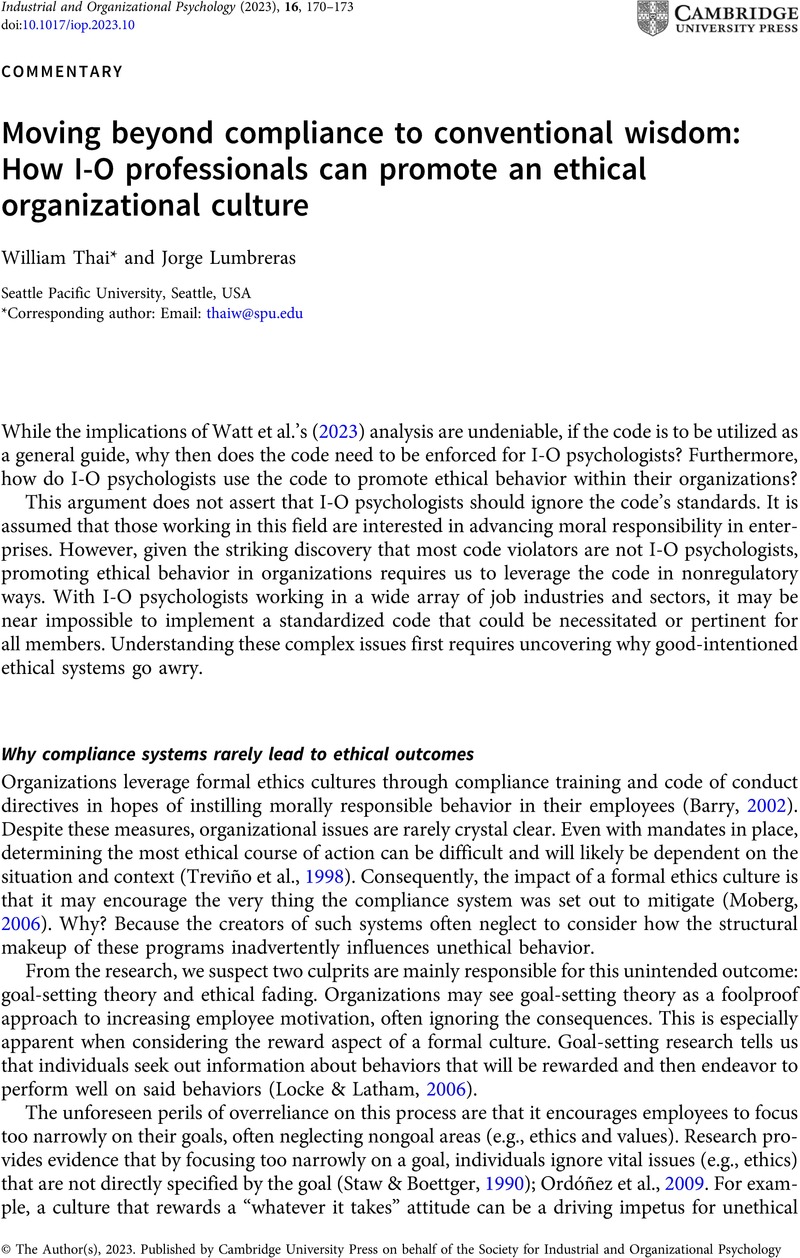No CrossRef data available.
Article contents
Moving beyond compliance to conventional wisdom: How I-O professionals can promote an ethical organizational culture
Published online by Cambridge University Press: 09 May 2023
Abstract
An abstract is not available for this content so a preview has been provided. Please use the Get access link above for information on how to access this content.

- Type
- Commentaries
- Information
- Copyright
- © The Author(s), 2023. Published by Cambridge University Press on behalf of the Society for Industrial and Organizational Psychology
References
Ardichvili, A., Mitchell, J. A., & Jondle, D. (2009). Characteristics of ethical business cultures. Journal of Business Ethics, 85(4), 445–451.CrossRefGoogle Scholar
Barry, M. (2002). Why ethics & compliance programs can fail:" Set it and forget it" doesn't work with ethics programs. Journal of Business Strategy, 23(6), 37–41.CrossRefGoogle Scholar
Dolan, S. L., & Bao, Y. (2012). Sharing the culture: Embedding storytelling and ethics in the culture change management process. Journal of Management & Change, 29(1), 10–23.Google Scholar
Falkenberg, L., & Herremans, I. (1995). Ethical behaviours in organizations: Directed by the formal or informal systems?. Journal of Business Ethics, 14(2), 133–143.CrossRefGoogle Scholar
Kerns, C. D. (2003). Why good leaders do bad things: Mental gymnastics behind unethical behavior. Graziadio Business Review, 6(4), 1–10.Google Scholar
Kuenzi, M., Mayer, D. M., & Greenbaum, R. L. (2020). Creating an ethical organizational environment: The relationship between ethical leadership, ethical organizational climate, and unethical behavior. Personnel Psychology, 73(1), 43–71.CrossRefGoogle Scholar
Locke, E. A., & Latham, G. P. (2006). New directions in goal-setting theory. Current Directions in Psychological Science, 15(5), 265–268.CrossRefGoogle Scholar
Moberg, D. J. (2006). Ethics blind spots in organizations: How systematic errors in person perception undermine moral agency. Organization Studies, 27(3), 413–428.CrossRefGoogle Scholar
Ordóñez, L. D., Schweitzer, M. E., Galinsky, A. D., & Bazerman, M. H. (2009). Goals gone wild: The systematic side effects of overprescribing goal setting. Academy of Management Perspectives, 23(1), 6–16.CrossRefGoogle Scholar
Rees, M. R., Tenbrunsel, A. E., & Bazerman, M. H. (2019). Bounded ethicality and ethical fading in negotiations: Understanding unintended unethical behavior. Academy of Management Perspectives, 33(1), 26–42.CrossRefGoogle Scholar
Rozin, P., Markwith, M., & Ross, B. (1990). The sympathetic magical law of similarity, nominal realism and neglect of negatives in response to negative labels. Psychological Science, 1(6), 383–384.CrossRefGoogle Scholar
Sekerka, L. E., Comer, D. R., & Godwin, L. N. (2014). Positive organizational ethics: Cultivating and sustaining moral performance. Journal of Business Ethics, 119(4), 435–444.CrossRefGoogle Scholar
Staw, B. M., & Boettger, R. D. (1990). Task revision: A neglected form of work performance. Academy of Management Journal, 33(3), 534–559.CrossRefGoogle Scholar
Tenbrunsel, A. E., & Messick, D. M. (2004). Ethical fading: The role of self-deception in unethical behavior. Social Justice Research, 17(2), 223–236.CrossRefGoogle Scholar
Treviño, L. K., Butterfield, K. D., & McCabe, D. L. (1998). The ethical context in organizations: Influences on employee attitudes and behaviors. Business Ethics Quarterly, 8(3), 447–476.CrossRefGoogle Scholar
Treviño, L. K., Weaver, G. R., & Reynolds, S. J. (2006). Behavioral ethics in organizations: A review. Journal of Management, 32(6), 951–990.CrossRefGoogle Scholar
Watts, L. L., Lefkowitz, J., Gonzalez, M. F., & Nandi, S. (2023). How relevant is the APA ethics code to Industrial-Organizational Psychology? Applicability, Deficiencies, and Recommendations. Industrial and Organizational Psychology: Perspectives on Science and Practice, 16(2), 170–173.Google Scholar




